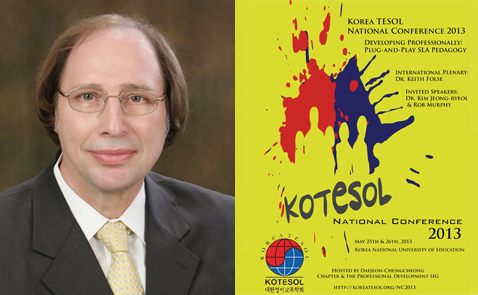
Developing Professionally: Reflecting on Our Practices [presentation #1]
The Changing Face of English in Korea [presentation #2]
Dr. David E. Shaffer
Abstract for presentation #1
In recent decades, the teaching of English in Korea has matured from a short-term stint abroad for the native English speaker to extended periods of employment. The NEST today is less likely to be a BA-generalist and more likely to be a TESOL-certificate or MA-TESOL holder. As with their Korean counterpart, today’s NEST exhibits an increased desire for professional development but an uncertainty of how to best go about obtaining it. This appetite for professional development is witnessed by the recent establishment of the KOTESOL Reflective Practice SIG and its spread of practicing groups as well as by the even more recent launching of the Professional Development SIG.
This presentation will promote reflective practice as a viable means of professional development for the EFL practitioner. It will provide an overview of the concept of reflective practice and an explanation of why it is important to the EFL teacher. Very much in line with the work of Thomas Farrell, it will suggest that reflective practice is evidence-based, to be engaged in by teachers through systematically collecting data in answer to superficially simple questions concerning one’s practice. Reflective practice will be shown to require dialogue to collaboratively complement individual reflection, as noted by B. Kumaravadivelu. It will be shown how reflective practice can be used as a tool to explore teacher beliefs and compare them to classroom practices, directly linking theory to practice. Additionally, it will be suggested that reflective practice is more than a method, that to be most effective, it becomes a way of life for the professional to systematically explore their teaching practice.
Throughout the presentation, attendees will be encouraged to reflect on their classes, on their dialogic reflection, and on the relationship between their teaching beliefs and teaching practices. The attendees will gain a clear understanding of what reflective practice is and how it is practiced, and hopefully the desire to practice it on a regular basis to better develop professionally.
Abstract for presentation #2
This presentation compares the present situation with respect to English language teaching in Korea and that of 40 years ago, when the presenter began his teaching career in Korea. The presentation touches on the 40-year differences in the use of Korean throughout the nation, differences in the English classroom and how they are equipped, differences in English teachers’ skills and world view, and on how English students themselves are different. The presentation also takes a look at NESTs in Korea then and now, the infusion of spoken English, changes in teaching methodology and learning styles, as well as the biggest problems for English learners, the biggest problems for English in Korea, and the prospects for TESOL in the years to come.
Bio-sketch
David E. Shaffer, (PhD Linguistics) is a long-time educator in Korea and long-time KOTESOL member. He is a professor at Chosun University, teaching in the graduate and undergraduate programs. Dr. Shaffer is the author of several books on learning English as well as on Korean language, customs, and poetry. His present academic interests include professional development, and young learner and extensive reading research, as well as loanwords and effective teaching techniques. Dr. Shaffer is active in numerous ELT associations in Korea and regularly presents at their conferences. As well, he is a founding member and executive officer of Asia TEFL. Within KOTESOL, he is presently Gwangju-Jeonnam Chapter President, editor of TEC News and KOTESOL Proceedings 2012, and a member of several committees, including the International and National Conference Committees.


